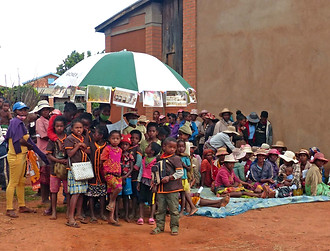Madagascar - Technical Due Diligence
Development of the local sourcing network of two companies - du Medical plants extract sector
Fambolena carried out a technical due diligence mission on behalf of the Land Degradation Neutrality Fund (LDN) in the field of plant extracts. Our task was to assess the feasibility of the local sourcing development plans of two companies based in Fianarantsoa.
The first company extracts artemisinin from the leaves of Artemisia Annua. The dry Artemisia leaves are purchased from small producers who grow it in the off-season in the regions of Haute Matsiatra and Amoron I Mania. This company wants to double the volumes collected within five years.
After a documentary review to gather as much data as possible on the cultivation of Artemisia, on the company in question, on the agricultural systems in the regions concerned and on the climatic conditions, we went to the field to meet the teams of the society as well as producers and representatives of the rural communities in which they operate. The company is well established and is very present with the producers with whom it has been collaborating for more than 10 years. We spent 4 days to visit all the production areas except for the marginal area in the far south of the island. We met relay farmers in charge of close supervision of producers, visited nurseries and met nurserymen, held meetings with producers and interviewed about twenty of them and interviewed several heads of Fokontani and mayors of rural communes. At the end of this work, we were able to assess the strengths and weaknesses of the development plan presented by the company, highlight the main risks and make proposals to limit their potential impacts. In particular to reduce the dependence of the development plan on the vagaries of the weather.





The second company produces quinine sulphate from Cinchona bark. These barks are currently imported from RD Congo and the company wishes to develop local production around Fianarantsoa. This production must be based on an industrial-type plantation managed directly by the company and by a network of small producers.
Cinchona cultivation is largely unknown in Madagascar. There was an attempted introduction to a site near Antananarivo during colonial times and the company is still in the early stages of developing local Cinchona bark production.
We were able to meet the company's teams, visit nurseries where the young Cinchona seedlings are raised, visit the two areas in which the first planting trials were settled and meet several of the farmers who carried them out. At the end of which we assessed the feasibility of developing a local supply, analyzed the potential impacts in terms of soil protection as well as on biodiversity and issued recommendations to optimize the chances of success and limit the potential negative impacts.


